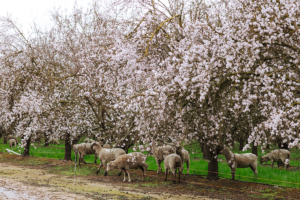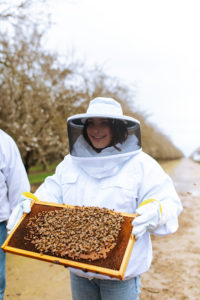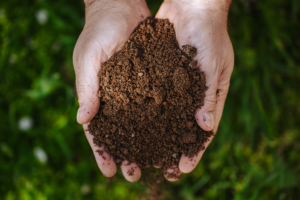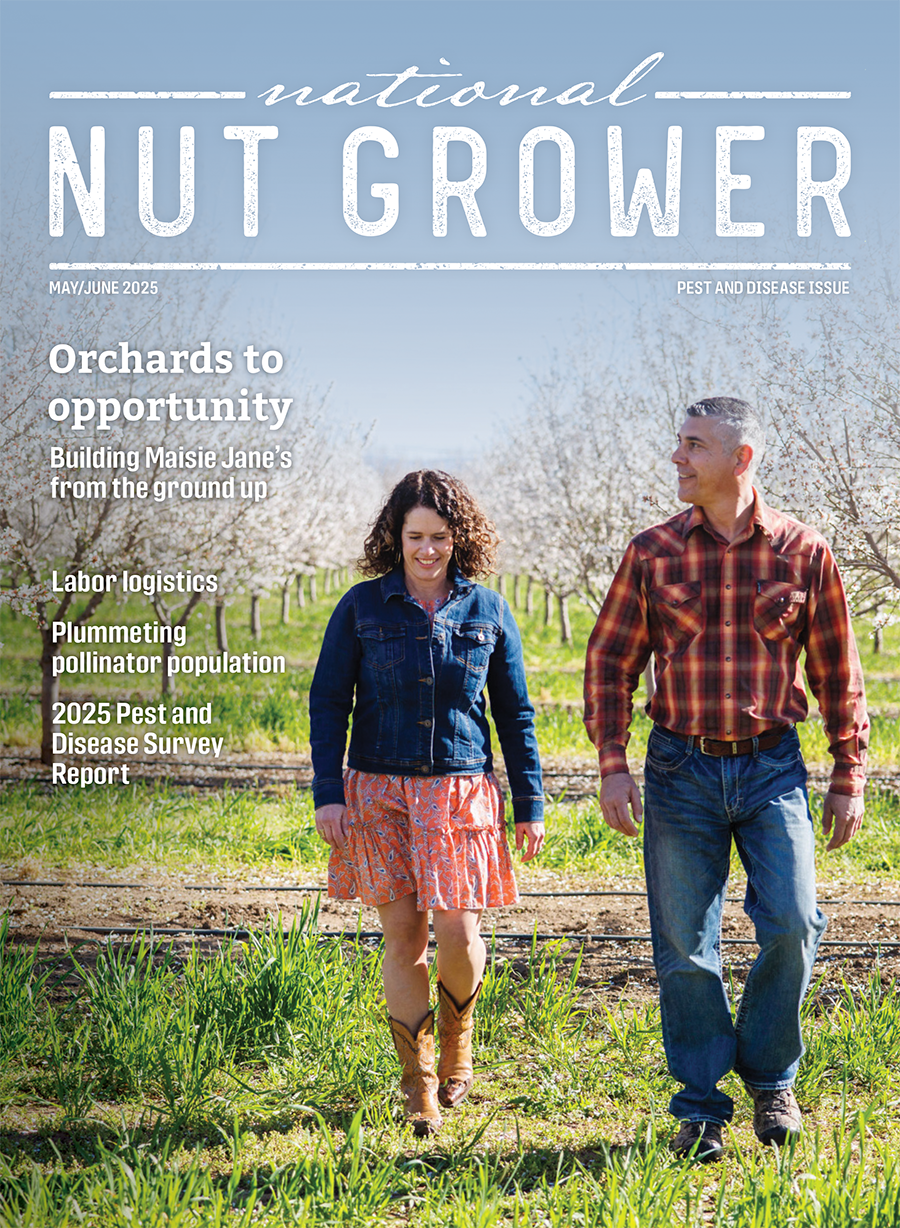
January/February 2025
Growing sustainably: Treehouse Almonds employs pollination techniques, values and stewardship
Treehouse California Almonds was founded in California’s Central Valley as a confectionary almond company approximately 40 years ago. The area was chosen because Central California offers a climate that is ideal for farming, with cold winters, warm, dry summers and ample water delivery systems creating a booming agriculture economy.
“We’re proud that Treehouse was the first in California’s almond category to implement many of today’s required quality and safety processes, including installing hygiene stations — a fundamental step in elevating the quality of our nuts and ensuring the well-being of consumers,” said Joe Gardiner, one of three third-generation farmers — along with brothers John and Jim — who work together through a vertically integrated operation to grow and supply almonds.

In the early 1900s, the Gardiners’ grandfather founded Gardiner Farms, initially cultivating cotton. As the demand for cotton fell, the family explored new agricultural opportunities. In the 1980s, the brothers’ father, Keith Gardiner, established the farm’s first almond orchards. Today, Joe resides at Gardiner Farms, based in Earlimart, California, where he manages the orchards and nurtures the trees throughout the growing season, leading up to harvest each fall.
“Today, we maintain a keen focus on maintaining the highest food safety and quality standards in the industry and meet the needs of our clients, some of the world’s most leading, discerning global food companies,” Gardiner said.
And while state-of-the-art processing facilities and stringent quality controls are important, they are meaningless without the almond supply to fill factories and meet the growing global demand for almonds.
“Growers and the land they steward are the foundation to our industry,” Gardiner said. “If farms are not successful, then no other supporting segment — including almond processing — will last. At Treehouse, we are keenly aware that growers, the land and the local agricultural community are the lifeblood, not only to our business but also to global food security.”
Sustainable mindset
A mission at Treehouse is to stay mindful of how today’s operations will affect future generations. Therefore, most of its sustainable practices are grounded in practicality. “For example, the relationship between bee pollinators and productive farmland is a symbiotic one. For the last 10 years, we have dedicated both creativity and focused effort in protecting nature’s most precious pollinators,” Gardiner said. “As almond growers, we need to ensure the health of our pollinators in order to have a successful crop.”

joins growers, processors, food brands
and others to help promote the future of family-run farming operations. Photo courtesy of Treehouse Almonds.
Beekeepers rely on almonds to support more than 50% of their annual revenue, and bees rely on the nutritious almond pollen, which is often the first food source after winter, to increase hive populations. It has been estimated that honeybee populations increase 15% to 20% during the almond bloom, Gardiner said.
To support bees, the farm actively preserves the diversity of plant life throughout its orchards by maintaining native habitat at the edge of fields, planting cover crops and providing fresh water during bloom.
“We also work to raise bee health awareness, provide fresh water and diverse pollen as food, partner with growers who protect pollinators, and participate in the California Almond Board Stewardship platform,” Gardiner said. “We are proud to have earned certifications from the Pollinator Partnership for making our orchards bee friendly.”
Treehouse also integrates animals, including sheep, into its almond orchards, which offers natural control of weed growth and reduces the need for herbicides. Additionally, grazing sheep promotes nutrient cycling, improves soil fertility and supports almond tree growth.
“While this is a newer practice, we are hopeful to find more scalable solutions to continue animal integration in the future,” Gardiner said.
Treehouse almonds are the premier example of a zero-waste crop — from the hulls to the shells — and even the damaged nuts are upcycled.
Treehouse supplements its shelling and hulling process with solar energy, transforming shells into nutritious feed and hulls into landscaping cover, Gardiner said. It also employs a zero-waste solution, Whole Orchard Recycling, to address almond orchards that have reached the end of their productive lives.
Its newest venture in sustainable and regenerative agriculture came in late 2024. In partnership with Sitos Group, Treehouse launched a $9 million slow pyrolysis biochar facility in Delano. It will be the first commercial biochar system of its kind on the West Coast and is expected to be fully operational by the end of 2025.
“This project will transform almond shells, processed through Treehouse’s hulling and shelling operations, into biochar — repurposing agricultural co-products for sustainable use — and represents another leading step forward in our company’s commitment to climate-smart action and regenerative agriculture in the almond category,” Gardiner said.
Biochar, a porous and lightweight carbon-rich material produced through pyrolysis of biomass, offers multiple environmental and agricultural benefits. Its stable carbon structure resists decomposition, preventing the release of methane back into the atmosphere and instead sequestering it in soil.
“This long-term carbon sink enhances soil quality by improving moisture retention, increasing nutrient holding capacity and providing a favorable habitat for beneficial microorganisms,” Gardiner said. “As a result, biochar application leads to improved crop yields, particularly in nutrient-poor or degraded soils, while reducing the need for chemical fertilizers.”
Beyond its agricultural advantages, biochar contributes to environmental sustainability by aiding in soil remediation, reducing nutrient runoff and offering a solution for organic waste management, Gardiner said.
Organic farming

While organic has been traditionally viewed as a niche market, Treehouse’s growers are proving that organic farming practices can be effectively integrated into commercial production.
“Our certified organic almonds are grown without the use of synthetic pesticides or fertilizers,” Gardiner said. “We use regenerative agricultural practices that not only protect but also improve soil health, promoting a healthier and more sustainable ecosystem. The absence of chemicals results in a purer and more intense flavor, and supporting organic agricultural practices contributes to the well-being of farmers and their communities.
“Further, our almonds are certified non-GMO, ensuring a 100% natural product free from genetically modified organisms.”
Looking ahead
As a family-centric business, Treehouse California Almonds is committed to ensuring the success of future generations of farmers and is part of The Almond Project, which unites almond growers, processors, innovative food brands and nonprofit organizations.
“Together, we are testing and implementing various soil health practices across California’s almond farms, focusing on outcomes like water retention, carbon sequestration and ecosystem biodiversity,” Gardiner said. “Our mission is to preserve natural resources, promote ecosystem regeneration, protect farming communities and secure the future of nutritious almonds.”









